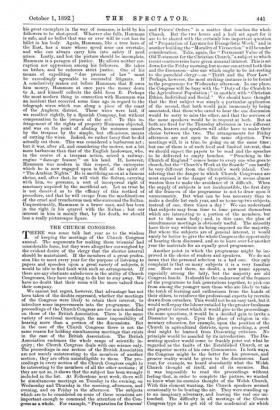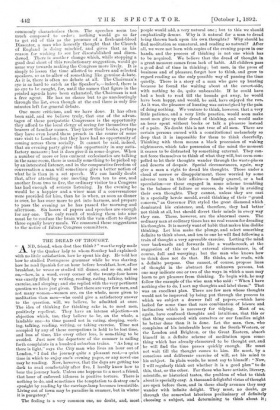THE CHURCH CONGRESS. T HERE was some talk last year as
to the wisdom of keeping the meetings of the Church Congress annual. The arguments for making them triennial had considerable force, but they were altogether outweighed by the evident desire of the clergy that the shorter interval should be maintained. If the members of a great profes- sion like to meet every year for the purpose of listening to papers and speeches upon a great variety of subjects, it would be idle to find fault with such an arrangement. If there are any obstinate unbelievers in the utility of Church Congresses, they have nothing to do but to stay away. We have no doubt that their room will be more valued than their company.
We cannot but regret, however, that advantage has not been taken of the doubts expressed, whether the meetings of the Congress were likely to retain their interest, to introduce some improvements into the programme. The proceedings of the Church Congress are too much modelled on those of the British Association. There is the same variety of sectional meetings, the same impossibility of hearing more than a portion of the discussions. But in the case of the Church Congress there is not the same reason for holding simultaneous meetings that exists in the case of the British Association. The British Association embraces the whole range of scientific in- quiry ; the Church Congress deals with one science only. The proceedings in one section of the British Association are not merely uninteresting to the members of another section ; they are often unintelligible to them. The pro- ceedings in every section of the Church Congress ought to be interesting to the members of all the other sections ; if they are not so, it shows that the subject has been wrongly included in the list. At Folkestone next week, there will be simultaneous meetings on Tuesday in the evening, on Wednesday and Thursday in the morning, afternoon, and evening, and on Friday in the afternoon. The subjects which are to be considered on some of these occasions are important enough to command the attention of the Con- gress as a whole. For example, " Preparation for Deacons' and Priests' Orders " is a matter that touches the whole Church. But the two hours and a half set apart for it are to be shared with the certainly less important question of " Preparation of Laymen for Evangelistic Work," and in another building the "Morality of Vivisection" will be under consideration. Take, again, the " Permanent Value of the Old Testament for the Christian Church," a subject to which recent controversies have given unusual interest. This is set down for the Friday morning, but no one can attend both this and the discussion—also one which ought to be interesting to the parochial clergy—on " Thrift and the Poor Law." Perhaps, however, the most striking instance is to be found in the programme for Wednesday afternoon. In one place, the Congress will be busy with the "Duty of the Church to the Agricultural Population ; " in another, with " Christian Ethics, Individual and Social." We should have thought that the first subject was simply a particular application of the second, that both would gain immensely by being associated, that those who cared to hear the one discussion would be sorry to miss the other, and that the services of the same speakers would be in request at both. But as both are fixed for the Thursday afternoon in two different places, hearers and speakers will alike have to make their choice between the two. The arrangements for Friday afternoon are not open to the same objection. Two meetings will, it is true, be going on at the same time ; but one of them is of such local and limited interest, that we should expect the papers to be read and the speeches to be delivered to empty benches. " Preaching in the Church of England" comes home to every one who goes to church, but the " Church's Work at the Seaside " can hardly be very different from the Church's work inland. Con- sidering that the danger to which Church Congresses are most exposed is the danger of repetition, it seems almost wanton thus to make the avoidance of it difficult. When the supply of subjects is not inexhaustible, the first duty of the framers of the programme is not to draw upon it unnecessarily. But what can be less necessary than to make a double list each year, and so to use up two subjects, instead of one, three times a day ? We can understand that subjects may from time to time present themselves which are interesting to a portion of the members, but not to the main body ; and, in this case, the plan of simultaneous meetings is obviously useful. The minority have their way without its being imposed on the majority. But where the subjects are of general interest, it would surely be better to give the whole Congress the opportunity of hearing them discussed, and so to leave over for another year the materials for an equally good programme.
Another point in which the programme might be im- proved is the choice of readers and speakers. We do not mean that the personal selection is a bad one. Our only complaint is that on many subjects it is a very familiar one. Here and there, no doubt, a new name appears, especially among the laity, but the majority are old Congress hands. It should be the endeavour of the framers of the programme to link generations together, to pick out from among the younger men those who are likely to take the torch of learning and enthusiasm from the hands of their elders, to reinforce the professional experts by recruits drawn from outsiders. This would not be an easy task, but it would well repay the labour entailed by the greater freshness and greater interest which it would give to the proceedings. On some questions, it would be a decided gain to invite a Dissenter to speak. Upon the place of religion in ele- mentary education, for example, upon the position of the Church in agricultural districts, upon preaching, a good deal might be learned from Dissenting criticism. No principle would be assailed by its introduction. The Dis- senting speaker would come to frankly point out what he regarded as the faults of the Established Church, or as the superior merits of his own Communion. In both ways, the Congress might be the better for his presence, and greater reality would be given to the discussions. Last year, for example, we heard abundantly what the Welsh Church thought of itself, and of its enemies. But it was impossible to read the proceedings without feeling that, in order to complete the picture, we wanted to know what its enemies thought of the Welsh Church. With this element wanting, the Church speakers seemed occasionally to be beating the air. They were standing up to an imaginary adversary, and leaving the real one un- touched. The difficulty in all meetings of the Church Congress type is to get rid of the academical air which commonly characterises them. The speeches seem too much composed to order ; nothing would go so far to get rid of this as the presence of a flesh-and-blood Dissenter, a man who honestly thought that the Church of England is doing mischief, and gives that as his reason for wishing to see her disestablished and disen- dowed. There is another change which, while stopping a good deal short of this revolutionary suggestion, would go some way towards making the Congress more lively. It is simply to lessen the time allotted to readers and selected speakers, so as to allow of something like genuine debate. As it is, there is often no debate at all. The Chairman's eye is as hard to catch as the Speaker's,—indeed, there is no eye to be caught, for, until the names that figure in the printed agenda have been exhausted, the Chairman is not a free agent. He has no choice but to go unrelentingly through the list, even though at the end there is only five minutes left for general debate.
One more criticism, and we have done. It has often been said, and we believe truly, that one of the advan- tages of these peripatetic Congresses is the opportunity they afford to the local clergy of seeing for themselves the bearers of familiar names. They know their books, perhaps they have even heard them preach in the course of some rare visit to London ; but they have had no opportunity of coming across them socially. It cannot be said, indeed, that an evening party gives this opportunity in any satis- factory measure ; but it does give it in some degree. When a number of more or less eminent ecclesiastics are talking in the same room, there is usually something to be picked up by an interested listener, and in the comparative freedom of conversation a man will sometimes give a better notion of what he is than in a set speech. We can hardly doubt that, after attending one meeting from ten to one, and another from two to five, the ordinary visitor to a Congress has had enough of serious listening. In the evening he would be a happier and a wiser man if a conversazione were provided for him, than he is when, as soon as dinner is over, he has once more to get into harness, and prepare to pass the evening as he has passed the morning and afternoon. Six hours of papers and speeches are enough for any one. The only result of making them into nine must be to confuse the brain with the vain effort to digest three equally heavy meals. We commend these suggestions to the notice of future Congress committees.



































 Previous page
Previous page